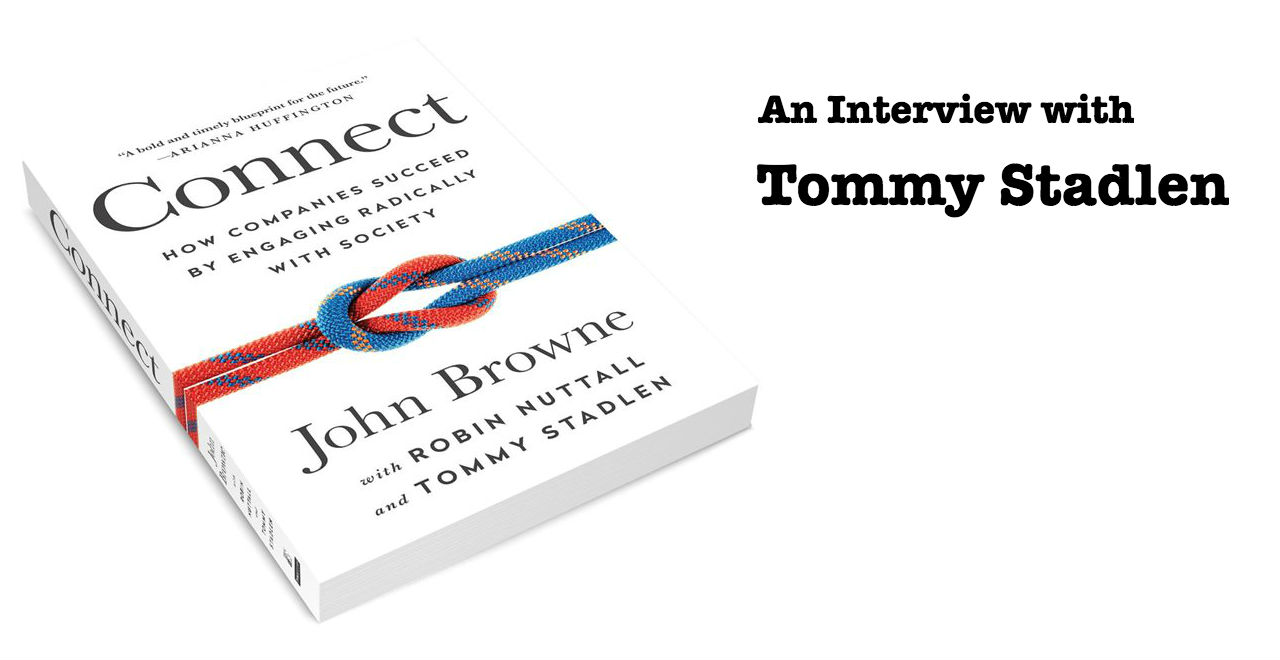Tommy Stadlen is a technology entrepreneur and author. He is a former McKinsey consultant, and worked with the Obama for America campaign in 2008 as a policy advisor. We caught up with Tommy in New York to discuss “Connect: How Companies Succeed by Engaging Radically With Society“, a bestseller he co-wrote with former BP CEO Lord Browne and Robin Nuttall.
Ulula Connect makes the business case for companies to engage radically with society in order to succeed. Can you summarize the key metrics and research supporting the case?
Tommy Connecting with society is the new frontier of competitive advantage. This is not a ‘soft’ issue. The value at stake is vast. Research by McKinsey for the book found that 30% of corporate earnings are at stake from a company’s interactions with governments, regulators, NGOs and other stakeholders. This includes significant upside potential as well as downside risk. Research also shows that the shares of companies which connect effectively outperform those of their competitors by 20 per cent over a ten year period.
Openness has always been the most effective way to build trust. Today, thanks to the rise of the Internet and mobile connectivity, transparency is no longer optional.
Ulula Connect provides a balanced perspective on the role of technology as “queen and servant” supporting greater transparency between business and society but creating new challenges to privacy. Some consumer facing companies thrive in the digital age but the majority remains scared of social media. What are the main lessons for companies to harness the power of digital technology to develop new modes of engagement with society?
Tommy Openness has always been the most effective way to build trust. Today, thanks to the rise of the Internet and mobile connectivity, transparency is no longer optional. The flow of information is more liquid than ever before and we have only seen the first signs of the flood to come. Companies can either embrace it or fight a doomed battle, ordering back the waves like King Cnut. This does not mean admitting defeat. Digital media act as amplifiers of good behaviour as well as bad. Businesses can turn online transparency to their advantage if they have nothing to hide, if they are willing to have a genuine dialogue, and if they use the proliferation of data without overstepping privacy boundaries.
Ulula Volkswagen’s “dieselgate”, the Samarco disaster or the more recent scandals of the Panama Papers call into question business integrity and call for the more genuine and radical transparency and engagement. Are shareholders and corporate leaders prepared to listen to what society may have to say if it means canceling a multi-billion dollar infrastructure, mining or renewable investment?
Tommy These events are tired re-runs of ancient scandals. Cycles of anti-business sentiment extend back millennia, all the way to ancient China, where we begin our book. Business is the engine of human progress but it has never enjoyed a truly harmonious relationship with society. It is almost as if we are uncomfortable in our own skin.
This fractured relationship comes at a cost for both sides. Take VW, for example. The rapid decline in its share price following “dieselgate” reflected our finding that 30% of corporate value is at stake. History is littered with companies which perished because they chose short-term illicit gain over long-term viability. Our aim in writing Connect was to articulate how business can thrive by engaging on society’s terms. It takes courage and leadership – but it can be done.
Companies must integrate societal and environmental concerns deeply into their everyday strategy and operations.
Ulula You estimate that only a third of all companies effectively engage with society. Looking to the future, what are the top innovations and changes companies need to make to connect successfully with society?
Tommy We identified the ‘30% phenomenon’. 30% of value is at stake; CEOs spend 30% of their time on this issue; and yet less than 30% feel they connect successfully. There is a huge prize for companies that fix this. If you think how hard organizations strive to gain a percentage point advantage in marketing or operations, here is an opportunity to achieve lasting distinctiveness. To do so, companies must integrate societal and environmental concerns deeply into their everyday strategy and operations. We set out four tenets of ‘Connected Leadership’ based on our observations of over 80 companies.
- Map your world. This is about developing a sensing mechanism to understand your societal context. It means knowing your stakeholders as well as your customers. Measuring the overall value at stake is also crucial.
- Define your contribution. A well-defined contribution matters because businesses must somehow meet societal needs to create value over time. The greatest companies explain with great clarity how the fulfillment of their purpose benefits society.
- Apply world class management. The management of the connection between business and society is rarely done as professionally as other parts of a business. Companies should manage it like any other corporate function.
- Engage radically. This is about a new era of transparency and requires complete openness. To earn trust and credibility, the private sector should engage the world on the front foot, building lasting relationships which are based on regular, authentic negotiation rather than PR propaganda, brinkmanship or passive silence.


